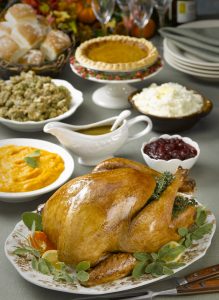
If you’re looking forward to a cornucopia of foods this holiday season, but not the aftermath of what overindulging means for your stomach, read on for 5 simple tips to enjoy your holiday dinner without stomach issues.
1. Smaller portions
If you feel a burning sensation in your chest area after you eat, you’re not alone. Heartburn and acid reflux happen when your stomach fills up and the acid goes up into your esophagus.
Eating smaller portions helps reduce those potential acid reflux triggers, since your stomach isn’t filled to the brim for so long, that way you’re not uncomfortable after your meal.
At a holiday meal, it’s not always easy to limit portions. But, you can build yourself a second plate and set it aside — or simply go back for round two (or three) later, once the food in your stomach has had a chance to digest.
Chronic heartburn, or GERD, can lead to potential serious long-term health concerns if not treated — so be sure to talk to your doctor about your concerns.
2. Drink water with your meal
Acidic and carbonated beverages (and alcohol) can trigger heartburn and acid reflux — so save the non-water beverages for before and after you eat, if at all.
You’ll also want to make sure you’re drinking water throughout the day since water keeps things flowing more smoothly throughout your gastrointestinal tract — and helps prevent waste from getting “stuck” and causing discomfort as it makes their way out.
3. Limit processed foods
Generally, families come together during the holidays and bring their dedicated homemade dishes to share. But there are often some processed foods mixed in with the buffet…which you’ll want to skip if there are tastier options.
Foods that don’t come in a box or package (read: fresh foods) are easier for your stomach to digest and will cause fewer issues going through your GI tract. It’s just one of the ways your diet can help colon issues.
4. Fiber
If you can incorporate food with fiber during your feast, it can help reduce constipation issues afterward. Soluble and insoluble fiber work to make waste softer and easier to pass through your intestinal system.
But this doesn’t mean you need to eat bran and prunes at a holiday dinner: Instead, think whole grains over white flour breads, and vegetables and nuts when you can.
Load up on sweet potatoes and broccoli. Toss almonds in salad; add crushed pecans to potato casserole; incorporate salads or dessert with fruit — like a fruit tart or fruit pies instead of cream pies; and swap hummus or guacamole for dairy-based dips.
5. Limit gluten
Gluten is a protein found in grains like wheat and rye, and for some people it can cause stomach issues — or other symptoms like fatigue, depression, seizures, infertility and more.
If you have or think you may have a gluten sensitivity, stay away from foods that likely contain gluten, such as:
- Green bean casserole
- Pie crusts
- Stuffing
- Gravy
- Vegetable dips
- Most pre-made salad dressings
Instead, stick to these foods, which are usually gluten-free:
- Turkey
- Sweet potatoes
- White potatoes
- Vegetables without sauce
- Rice (without sauce or wheat-based seasoning)
- Cranberries and cranberry sauce
Talk about your GI concerns
If you’re having stomach issues after eating, talk to a gastrointestinal specialist about how to make things better. We’re here for you at Gastrointestinal Specialists, P.C. in Troy, Mich. Contact us to request an appointment today!